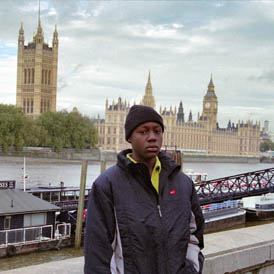‘Underpants bomber’ sentenced to life
Umar Farouk Abdulmutallab, who attempted to blow up a US airliner on Christmas day in 2009 with a device concealed in his underwear, has been given a life sentence.

Nigerian Abdulmutallab, pleaded guilty last October to eight charges of attempting to destroy Northwest Airlines Flight 253 from Amsterdam to Detroit.
The former student at University College London has been sentence to life imprisonment without parole.
Abdulmutallab wore a white t-shirt and skull cap, and sat impassively as the sentence was read out.
“This was an act of terrorism that cannot be quibbled with,” said US District Judge Nancy Edmunds, who imposed the maximum sentence allowed.
Earlier, the 25-year-old used a four-minute address to the court to repeat that his attack was attended to avenge “the attacks of the United States on Muslims.”
The plane left Amsterdam with 290 people on board. As it approached Detroit, Abdulmutallab tried but failed to ignite a device in his underwear.
Abdulmutallab suffered severe burns and was subdued by passengers and crew on the flight.
He admitted to eight charges including conspiracy to commit an act of terrorism and attempted use of a weapon of mass destruction.
When pleading guilty in October, he called the bomb a “blessed weapon to save the lives of innocent Muslims.”
“I intended to wreck a US aircraft for the US wreckage of Muslim lands and property,” Abdulmutallab told the court.
“If you laugh at us now we will laugh at you later, on the day of judgment,” he added and shouted “Allahu akbar” [God is great] as he left court.
Abdulmutallab has been held in prison in Michigan pending the trial, and during interviews with US investigators, said he had received bomb training from al-Qaeda militants in Yemen.
Video footage later emerged showing Abdulmutallab at a jihadi training camp, in which militants shoot guns at British and Israeli flags, as well as planes.
In the footage, he also delivered what appeared to be a martyrdom message, saying: “You brotherhood of Muslims in the Arabian Peninsula have the right to wage jihad because the enemy is in your land, with their armies, the Jews and the Christians and their agents. Allah said if you do not fight back, he will punish you and replace you.”
Abdulmutallab was under the tutelage of the so-called Osama bin Laden of the internet, US citizen Anwar al-Awlaki, who was killed by a drone strike in Yemen last September.
Awlaki is believed to have recruited Abdulmutallab while in London.
In what is thought to have been one of his final internet video messages, Awlaki said: “Our brother Umar Farouk Abdulmutallab has succeeded in breaking through the security systems that have cost the US givernment alone over $40bn since 9/11.
“It was only a technical issue with the device that saved the flight from total destruction. however, the attempts of the Mujahadeen will not cease.”
Awlaki was also linked to other British-based men linked to al-Qaeda, including 7/7 bombers Mohammad Sidique Khan and Shehzad Tanweer, jailed radical cleric Abu Hamza and Roshonara Choudhry, who attempted to kill MP Steven Timms because he had supported the invasion of Iraq.
Read more: Awlaki's sphere of influence
Jamal Osman, a member of an investigative team working for Channel 4 News on a piece about Britain Muslims travelling to Yemen met Abdulmutallab in Yemen less than two months before the botched attack.
“In October 2009, I went on an assignment in Yemen for Channel 4 News.
The story I pitched to the editor was to see whether Muslims from Britain travel to Yemen for religious purposes or do they train as jihadists.
I went to Yemen find out the truth about the link between British-Muslims and al-Qaida in the country. As part of my research, I arranged to meet a British Muslim, “Ahmed”, through a source in the city. He was with another man..and introduced me to “a Nigerian, who has studied in the UK”.
Umar, who seemed a quiet and devout Muslim, was wearing a typical Islamic dress and covering his head with a male-scarf.
He sounded a very peaceful man who doesn’t condone violence. And I believed him. I vaguely recall him giving a very short answer saying something like: “Things happen with God’s will and we have to accept that it is beyond our power.”
As Umar was a Nigerian I had to rule him out of my potential story as I was concentrating on British people. I never thought he would be accused of such actions and I had no idea he apparently had these plans.
Initially, after the Christmas incident, I didn’t realise Umar was the man I’d met in the café. But, after seeing different photos of him on television, I realised it was him”
-
Latest news
-
Taylor Swift’s new break-up album breaks records3m

-
NHS trust fined £200K for failings that led to death of two mental health patients3m

-
Sunak vows to end UK ‘sick note culture’ with benefit reform3m

-
‘Loose talk about using nuclear weapons is irresponsible and unacceptable’, says head of UN’s nuclear watchdog3m

-
‘There wasn’t an Israeli attack on Iran,’ says former adviser to Iran’s nuclear negotiations team7m

-




